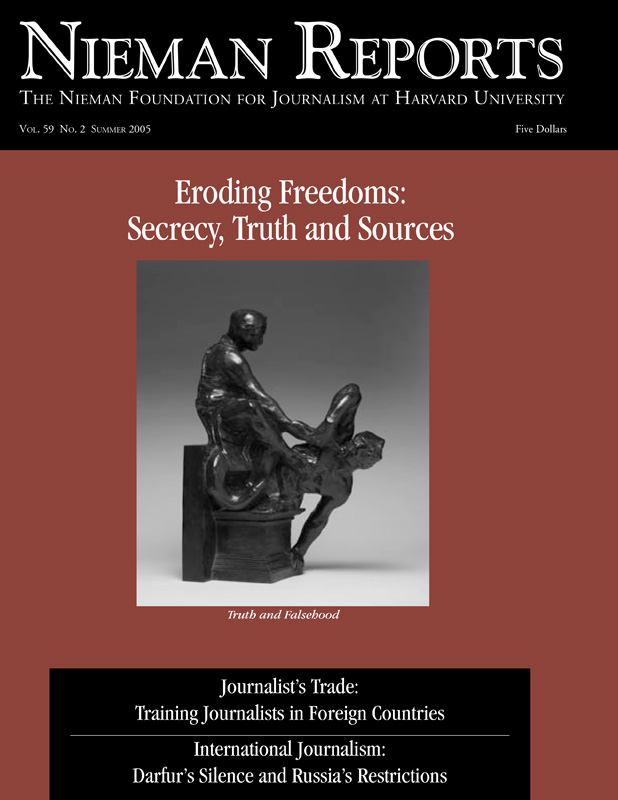As transatlantic relations went sour over the Iraq War, long dormant anti-American sentiments surfaced in Germany. Many Germans regard the invasion and occupation of Iraq as the most blatant example of United States unilateralism. As a result, Americans living in Germany—regardless of their personal views—are often confronted with harsh criticism of their country and sometimes hostility.
One group of Americans, however, remains welcomed here—journalists. Whether sympathetic or critical of the Bush administration, journalists are interviewed and invited to publicly discuss the war and write columns. In sharp contrast to the diplomatic strains and personal reactions, the press in Germany seem curious to learn why the Bush administration acts as it does and what its electorate wants, and so reporters here remain receptive to frank debate on this topic. For them, visiting American journalists serve as interpreters and public analysts.
Since 1998 the American Academy in Berlin, founded by Richard Holbrooke in the mid-1990’s, has hosted American scholars, artists, writers, policy experts, and journalists. Reporters and columnists from publications such as The New York Times, The New Republic, The New Yorker, and the Financial Times have been in residence at the Academy’s lakeside villa. Each semester the 12 fellows create a mix of disciplines and ages, making the academy’s program a bit different from the Nieman Fellowship, with its sole participants being journalists. Yet aspects of this time spent in Berlin strike me as being common to the Nieman experience.
During the four- to five-month residency at the academy, fellows have dedicated time to devote to a study project, which they present as part of their admission proposal. The topics of these projects seem quite similar to those proposed by Nieman Fellows: immigration, tax issues, and environmental policy being among them. For some journalists this fellowship offers a chance to return to Germany, where they reported from years ago, and explore what has changed (or in some cases try to understand the stagnation). For others, this is their first trip to Europe and an opportunity to gain expertise in European affairs after reporting from other parts of the world.
In Berlin, many layers of the last century’s dramas remain tangible in the personal experiences of people whom these journalists meet. Berlin offers an instructive laboratory of change—not all of it for the better—in the wake of the disappearance of its dividing wall. Poland is only 50 miles away, so the issues and challenges of a newly united Europe can be examined more closely.
Not only is a changing Europe ripe for exploration, but also in this German capital the Americans who visit with different backgrounds, interests, disciplines and views have a chance to talk at length with one another. And mealtime debates are often sparked by conversations that a fellow might have had with a German counterpart involving topics ranging from religion to international relations, from cultural to identity issues. Or remarks made by visitors here can inflame arguments and stir controversy. Two days after September 11, 2001, the late Susan Sontag gave a talk at the academy, and her critical remarks about the United States were published in The New Yorker, setting off a vigorous debate here and abroad.
This event offered a powerful reminder of how being part of a diverse group of Americans in a different cultural and political setting can be a powerful catalyst for new and deeper insights about one’s own country. And there is yet another aspect of this learning experience that, for others, might be an even more valued part of this fellowship: As discussions among Americans are made accessible to Germans, the fellows demonstrate, by example, the diversity of American thought, something rarely reflected in German media coverage of U.S. politics.
This is something the Nieman Fellowship does, too. Ten years ago, when my Nieman year ended, each of us returned home with a broader view of Europe after our fellow from Sarajevo shared with us his life and reporting experiences there. And we understood Asian affairs more clearly after many discussions with two Chinese fellows, one from Hong Kong, the other from Beijing. And there was no doubt that we all left with greater appreciation for the differing attitudes that exist among Americans.
Now at the American Academy in Berlin, I am fortunate to be able to listen in on similar conversations, remembering well the life-changing effect they can have.
Paul Stoop, a 1995 Nieman Fellow, is deputy director of the American Academy in Berlin. More information about the academy can be found a www.americanacademy.de.


